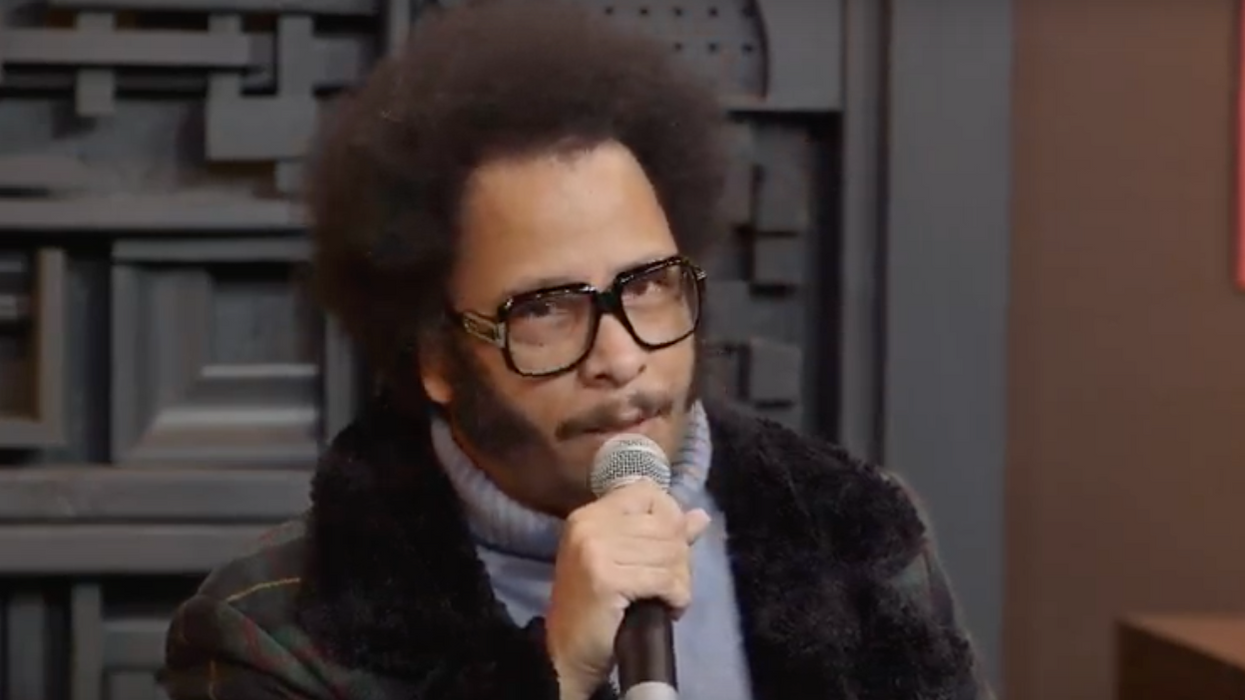How Boots Riley Learned to Direct By Watching Youtube Videos
Along with actor/director Chiwetel Ejiofor, the Sorry to Bother You director explains the preparation (and hustle) it takes to become a first-time director.

Sitting down at the 2019 Sundance Film Festival as part of the Cinema Café panel series, Ejiofor and Riley answered questions from New York Times moderator as well as from the audience. As it turns out, Chiwetel Ejiofor was actually one of Boots Riley’s mentors during the Sundance Directors Lab that work-shopped Sorry to Bother You. They both had a front row view of Riley’s process getting the film written, financed, and eventually, premiered at the Sundance film festival. And it wasn't easy.
Watch the recording of the livestream for yourself, and check out some of our favorite takeaways below.
You have to put the film above your own, or anybody else's, ego
Boots Riley had been a music producer for 20 years prior to making Sorry to Bother You, and he credits the way he learned to execute the vision of a song with musicians as helping him know how to directo. From Riley:
“I would be working with amazing people that know way more about music than I do. They know more about music, but i have to be the one with the vision, otherwise it’ll be shit. I have to get them to buy into it, and communicate with them. Even though guitar player is best guitar player around, we don’t need a guitar solo in every song. Or when the bass player has a better idea than me, I take it. I have to put the song first, and not my ego. That way of working is how you complete anything, whether you build a house or make a film”
Talk to directors, read books, and watch behind-the-scenes videos on Youtube
It took Boots Riley seven years working on the idea of Sorry to Bother You before he was able to start making it. Once he had gotten the film going, he realized he needed, above else, to learn how to communicate with actors and department heads. From Riley:
“I would go to directors and say how do you talk to actors? Can you give me an example? I also read this book, Acting for Directors. The stuff is reinforced at Sundance, about getting people to come from inside themselves. As opposed to saying, “You need to be more angry,” say “Stab them with that line.”
I watched a lot of behind-the-scenes on Youtube…it it was like shadowing people. I watched The Faces of January with Vigo Mortensen, there’s the whole movie, but with a camera capturing the set, with the score and everything…It’s about communicating everything, the idea to the team. I had lots of photographs for every scene, lots of references, down to this is the way the wall should look. We used a picture of Bob Marley’s bedroom for Cassius’ bedroom.
You have to get people hyped for what you’re doing.”
When you need to employ some old school Hollywood name dropping
Riley explained that it was hard to get the film made, and that he often had to name drop as part of the strategy. “I’d say, ‘I was hanging out with Chiwetel and he said he like it,’” explained Riley. “You should never name drop, Mick Jagger told me that,” added Ejiofor. Here is an explanation from Riley on how they got the financing for a film that did not necessarily fit the investors mold of success:
“What had to do was a game of stone soup. ‘Look at this soup we’re cooking, you want to put your ingredients too?’ And then keep dropping names. David Cross and Patton Oswalt signed on first. That wasn’t enough to get it made. Then Sundance [Labs] came. There’s a myth that if you go through the Labs, you get into the festival. It’s not true. But I did utilize that myth when talking to investors!
Just to get people to click on the pdf and read it, to actually get them to read it was hard. I did the old school Hollywood name dropping.”
For more, see our ongoing list of coverage of the coverage of the 2019 Sundance Film Festival.
No Film School's podcast and editorial coverage of the 2019 Sundance Film Festival is sponsored by RODE Microphones and Blackmagic Design.











![Ethos, Pathos, Logos: 20 Effective Ways to Advertise [Infographic]](https://nofilmschool.com/media-library/ethos-pathos-logos-20-effective-ways-to-advertise-infographic.jpg?id=34064614&width=600&height=600&quality=90&coordinates=560%2C0%2C0%2C0)

